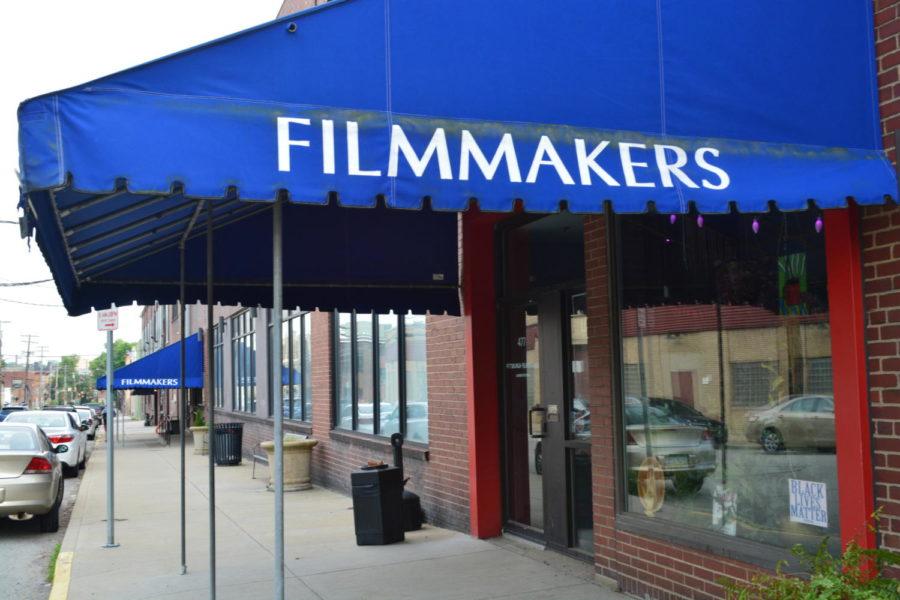Pittsburgh Filmmakers to close doors in North Oakland
The Pittsburgh Filmmakers institute will close its Oakland location this fall amid financial difficulties. (Photo by Sareen Ali | For The Pitt News)
May 29, 2018
After 20 years of providing classes to residents of Pittsburgh and students at Pitt, Pittsburgh Filmmakers will end its days in Oakland.
Due to financial struggles, Pittsburgh Filmmakers has canceled its fall courses in film and photography, and has made plans to sell its building on Melwood Avenue in North Oakland where those classes were held. It will also consolidate staff and programs at the Pittsburgh Center for the Arts on Fifth Avenue in Shadyside.
Pittsburgh Filmmakers — one of the oldest and largest nonprofit media arts organizations in the United States — bought the building in 1998 for $1.2 million, where it offers independent certificate programs and public showings of art films. Filmmakers also worked in collaboration with the Pitt film and media studies department to offer classes to Pitt students.
In 2006, Pittsburgh Filmmakers merged with Pittsburgh Center for the Arts, which at the time was facing financial difficulty. The organization was forced to lay off 20 employees in 2015 because it could not meet payroll — and is facing the loss of future classes. Courses in the fall of 2018 will not be held due to debt. Classes should resume in spring of 2019, according to Will Zavala, associate professor at Pittsburgh Filmmakers.
“Right now, Pittsburgh Filmmakers will continue for the summer exactly unchanged,” Zavala said.
Randall Halle, director of Pitt’s film and media studies program, has spoken with colleagues at Pittsburgh Filmmakers and was aware of the challenges confronted by the institution. He said due to Filmmakers’ relocation to the Pittsburgh Center for the Arts, there would likely not be the same kind of collaboration with the institution.
“We will have a new structure in place with little disruption to currently enrolled students,” he said. When asked about the effect of this situation on Pitt’s film and media studies program, Halle was confident.
“I anticipate that we will see an expansion of students in film and media studies courses, because classes will be offered on the Oakland campus,” he added — but noted that with the expected growth, definite changes will be made.
“The students in the film and media studies program will have a program focused specifically on their needs,” Halle explained. “The program will offer new opportunities, like broadcast courses to integrate students into the new Atlantic Coast Conference.”
Noah Livingston, a senior film major, feels that although the University is making a good effort to compensate for the loss of the Melwood building, the presence of a space just for film students will be missed.
“The best part about Filmmakers was the actual physical presence,” he said. “Having a separate place just for film was special in such a crowded university. The space is beautiful — I almost wish Pitt could buy the space and make it a part of the University.”
Livingston said that the University and his film professors have been communicating with film majors regarding the plan of action for the fall semester given the Filmmakers building will not be housing many of their required classes.
“There has been lots of communication, it doesn’t seem like the fall semester will be that big of an issue with how quickly the department has been reaching out to solve any problems,” he said.
Ultimately, Livingston said that the only true harm in the closure of this building would be if the University failed to provide for its thriving community of filmmakers and film-lovers.
“If the University can give us the space and resources that our growing major deserves, I think we will be in a great place as a department even without the institution of Pittsburgh Filmmakers,” he said.
Pittsburgh Filmmakers will host “Mottled Metal,” a multimedia exhibition exploring the romanticization of the industrial landscape from May 25 to July 30 at its Melwood Avenue theater before it closes.



